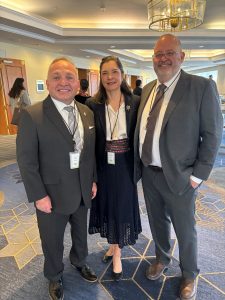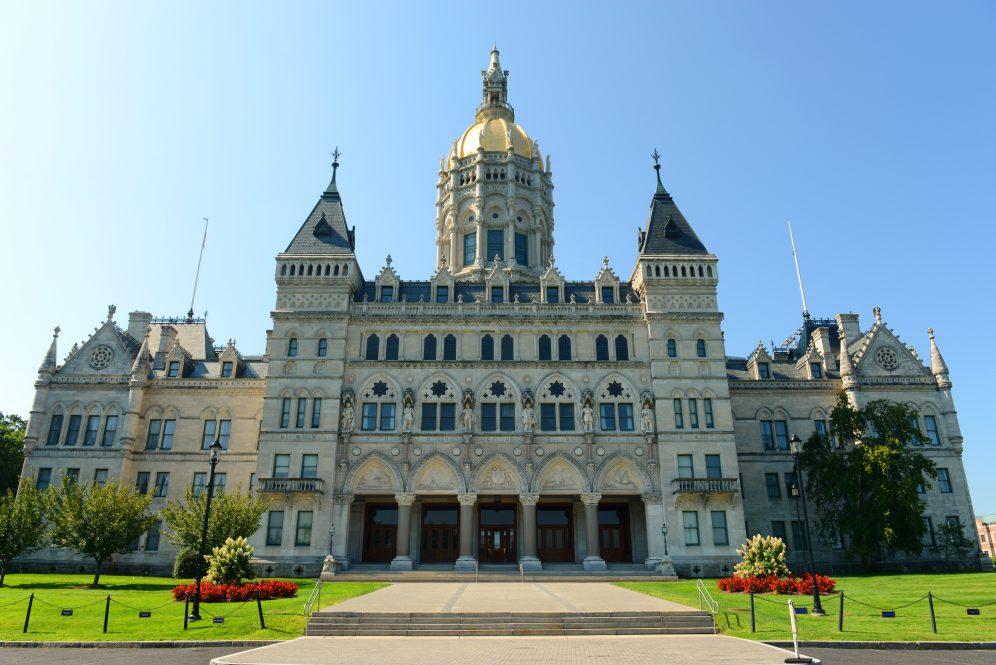The seeds for the first Latino and Puerto Rican Policy Agenda Summit in Connecticut were planted during conversations in the fall of 2023 between UConn School of Social Work Professor Lisa Werkmeister Rozas and Charles Venator Santiago, an associate professor with appointments in UConn’s Department of Political Science and El Instituto: Institute of Latina/o, Caribbean, and Latin American Studies.
“I had some conversations with Charles regarding the Puerto Rican Studies Initiative and its collaboration with the Puerto Rican and Latin@ Studies Project at the School of Social Work,” says Werkmeister Rozas. “As we started to discuss the collaboration, we talked about the overall needs of the Latine community in Hartford and in Connecticut overall.”
Venator Santiago had also been having similar discussions with Werner Oyanadel, the Latino and Puerto Rican Policy Director for the Connecticut General Assembly’s Commission on Women, Children, Seniors, Equity, and Opportunity (CWCSEO), about creating a policy agenda for the Puerto Rican and Latine communities. After the three met, Werkmeister Rozas suggested conducting listening sessions throughout the state with Spanish-speaking members of the community to gather data about key concerns and priorities.

Tuning Into the Latine and Puerto Rican Communities
The first of several listening sessions, dubbed Tu Voz, Tu Influencia – which means “Your Voice, Your Influence” – took place in November 2023 in New London at the Hispanic Alliance of Southeastern CT, a nonprofit that advances Hispanic contributions to the state’s southeastern community. That session was followed by events in Hartford, UConn Waterbury, and in New Haven. More than 100 residents participated in these sessions.
During this time, the three co-organizers also planned the summit event, called “Building a Better Future: The Latino and Puerto Rican Policy Agenda Summit,” inviting local and state officials, including Lt. Gov. Susan Bysiewicz. “We wanted it to take place before the beginning of the legislative session so that it could actually help guide the agenda building process,” says Werkmeister Rozas. State legislators and local municipal leaders were among the approximately 150 people in attendance.
During the daylong summit, speakers and panelists discussed a range of issues affecting Latine communities across the state, including housing; access to health and mental health; education; voting and civic engagement; and language and linguistic justice.
Venator Santiago pointed to the burdens of high rents and mortgages for Puerto Ricans who might spend up to half of their salaries in housing costs.
Language barriers linked all of the issues. “In the listening sessions, there were repeated concerns about educational disparities as a result of the language barrier, as well as difficulty accessing quality health and mental health care due to lack of Spanish-speaking providers or qualified translators. [Community members] often feel marginalized and powerless when navigating English-dominant systems and are often ignored, misinformed or misunderstood as a result of cultural imperialism embedded in all systems,” says Werkmeister Rozas.
Continuing the Conversations
Werkmeister Rozas, Venator Santiago, and Oyanadel will continue to collect data through listening sessions in other parts of the state. They are planning to host another summit in Fall 2024. The co-organizers have also applied for grant funding to support their research and policy-building efforts.
“We are very excited about the response and information gathered and plan to gather and share the recommendations that were obtained in the summit panel sessions, as well as the results from the listening sessions in a report,” Werkmeister Rozas adds. “We would also like to continue conversations with local and state legislators in terms of what might help them with building their own policy agendas.”
While the work continues, the summit was a notable step forward. “The Latino Summit has not only marked a significant milestone in our collective journey towards empowerment but also established a new benchmark for meaningful dialogue and action,” says Oyanadel, CWCSEO Latino & Puerto Rican Policy Director. “Through the unwavering dedication and passion of every participant, we have transformed aspirations into concrete legislative priorities. This achievement proves that together, we can create mechanisms for a future that both honors our rich heritage and addresses the challenges that lie ahead.”
Despite the fact that a majority of Latinos in Connecticut do not participate in politics, Venator Santiago hopes the summit was “an opportunity to begin a conversation on how to develop a collective agenda for the state.”
The summit event was highlighted in a report by NBC Connecticut.
The summit was supported by a number of partners at UConn and in Connecticut, including the CWCSEO, Hartford Foundation for Public Giving, Latin Financial, the Latino Endowment Fund, as well as the SSW’s Nancy A. Humphreys Institute for Political Social Work. The co-organizers report will be published on Puerto Rican Studies Initiative website.



